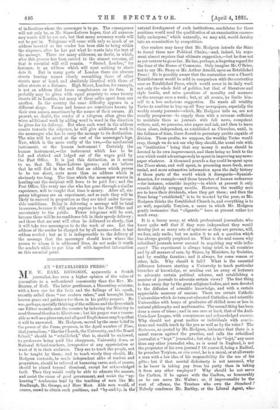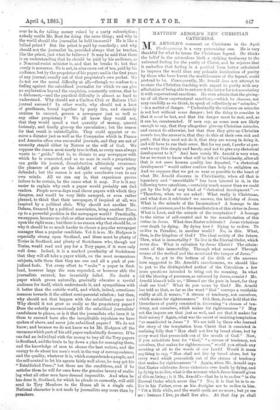AN "ESTABLISHED PRESS." •
MR. W. EARL HODGSON, apparently a Scotch journalist, has even a higher opinion of the value of journalists in a well-ordered community than the Rev. Mr. Hunter, of Hull. The latter gentleman, a Dissenting minister, with a keen eye for the facts and the failings of his epoch, recently called them " our modern rulers," and besought from heaven grace and guidance for them in his public prayers. He was, perhaps, specially thinking of the millions and the lives which one Editor recently cost the country by inducing the Ministry to send General Gordon to Khartoum ; but his prayer was a reasonable as well as a pious one, and all good Englishmen may hope that it will be answered. Mr. Hodgson, moved by the same belief in the-power of the Press, proposes, in the April number of Time, that journalism, " like the Church, the University, and the Board School," should be " established," that is, should be endowed, its professors being paid like clergymen, University dons, or National School-teachers, irrespective of any appreciation or want of it in their audience. They are to teach the people, not to be taught by them ; and to teach wisely they should, Mr. Hodgson contends, be made independent alike of readers and proprietors, should be relieved of harassing cares, and, of course, should be placed beyond dismissal, except for acknowledged fault. Then they would really be able to educate the masses, and assist the cause of good government, and resist the " upheaving" tendencies bred by the teaching .of men like Mr. Bradlangh, Mr. George, and Herr Most. Able men would, of course, crowd to obtain such positions, and "by-and-by, in the'
natural development of such institutions, candidates for those positions would need the qualification of an examination successfully undergone," which naturally, we may add, would develop into an examination by competition.
Our readers may fancy that Mr. Hodgson intends the State to found these new Political Chairs,—and, indeed, his argument almost requires that ultimate suggestion,—but he does not as yet venture to go so far. He has, perhaps, a lingering regard for the time of the House of Commons. Only imagine Mr. O'Brien, not to say Mr. Story or Mr. Arthur Arnold, upon an Established Press ! He is possibly aware that the contention over a Church 'Establishment would be mild in comparison with the contention over an Established Press, which would cover in its daily work not only the whole field of politics, but that of literature and style beside, and raise questions of morality and manners on the average once a week ; but, at all events, he limits himself to a less audacious suggestion. He wants all wealthy Tories to combine to buy-up all Tory newspapers, especially the weekly county journals—which, Mr. Hodgson tells us, are not usually prosperous—to supply them with a revenue sufficient to maintain them as journals with full news, competent writers, and, we presume, nice paper and ink, and then to leave them alone, independent, as established as Churches, until, in the fullness of time, there flowed-in pecuniary profits capable of division. Those profits, we suppose, the wealthy Tories would reap, though we do not see why they should, the usual rule with an"institution " being that any money it makes should be devoted to its own improvement, and there being no limit to the sum which could advantageously be spent in improving any newspaper whatever. A thousand pounds a day could be spent upon the Times alone, and well spent, in procuring more fresh, more varied, and more exhaustive information upon the daily history of those parts of the world which it disregards—SpanishAmerica, for example—and those branches of human endeavour —for instance, scientific inquiry—in whieh at present it only records slightly scrappy results. However, the wealthy men are to have their dividends, when they get them ; and then the Press being "established," is to be trusted by the poor, as Mr. Hodgson thinks the Established Church is, and everything is to go well, especially Toryism, a cause in which Mr. Hodgson gently insinuates that " oligarchs " have at present rather too much sway.
It is a• funny essay, at which professional journalists, who know quite well that if they were independent they would develop just as many sets of opinions as they are persons, will, we fear, only smile; but we notice it to ask a question which has always greatly perplexed us. What is the real reason why subsidised journals never succeed in acquiring any wide influence ? The experiment is always being tried, in all countries and by all manner of men, by States, by Ministers, by Societies, and by wealthy fanatics ; and it always, for some reason or other, fails. Why should it fail ? What is the essential difference between starting a University to teach particular branches of knowledge, or sending out an army of lecturers to advocate certain political reforms, and establishing a number of journals to advocate certain views ? The first thing is done every day by the great religious bodies, and men devoted to the diffusion of scientific knowledge, and with a certain appreciable measure of success. There are certain Catholic Universities which do turnout educated Catholics,-and scientific Universities with heaps of graduates all skilled more or less in natural philosophy and mathematics. The second thing has been done a score of times ; and in one case at least, that of the AntiCorn-Law League, with conspicuous and acknowledged success. Why should not great parties or individuals with convictions and wealth teach by the pen as well as by the voice ? The Scotsman, as quoted by Mr. Hodgson, intimates that there is a moral reason against the practice, and calls the enbsidised journalist a " kept" journalist ; but why is he "kept," any more than any other journalist who, as is usual in England, is not the proprietor of his own journal ? Of course if, being a Radical, he preaches Toryism, or vice versa, he is a rascal, or at all events a man with a low idea of his responsibility for the use of his gifts ; but if that mental dishohesty is not assumed, why is he baser in taking pay from his party than in taking it from any other employer? Why should he not serve the Carlton, if he agrees with the Carlton, as honourably as he can serve Mr. Walter; or, if impersonality be the root of offence, the Trustees who own the Standard ? Nobody condemns Mr. Bartley, or the Liberal Agent, who ever he is, for taking money raised by a party subscription ; nobody scolds Mr. Burt for doing the same thing; and why in the world should the journalist be held immoral? He is like a bribed priest ? But the priest is paid by somebody; and why should not the journalise be, provided always that. he teaches, like the priest, just what he believes ? It may be said that there is an understanding that he should be paid by his audience, as a Nonconformist minister is, and that he breaks it; but that surely is nonsense. He is not, in nine cases out of ten, paid by his audience, but by the proprietor of his paper; and in the first years of any journal, usually out of that proprietor's own pocket. We do hot see the moral difficulty at all,—though we confess to a feeling against the subsidised journalist for which we can give no explanation beyond the suspicion, constantly untrue, that he is dishonest,—and the practical difficulty is almost as hard to understand. Why should not a Carlton Club or Reform Club journal succeed ? In other words, why should not a knot of gentlemen, bound together by party ties, and sincerely anxious to succeed, govern a newspaper just as well as any other proprietary ? We all know they would not, that they would spend a vast quantity of money, . quarrel furiously, and finally give-up the speculation; but the reason for that result is unintelligible. They could appoint or remove a dictator just as well as the Companies which in France and America often own successful journals, and they are not of necessity stupid either by Nature or the will of God. We suppose the reason most nearly true is that, as every man always wants to " guide," that is, to dictate to any newspaper with which he is connected, and as no man in such a proprietary can guide his journal, dissatisfaction ultimately overcomes the pleasure of gain or the delight of seeing one's party defended ; but the reason is not quite conclusive even to our own minds. All we can say is, that experience proves failure to be certain, be the cause what it may. Nor is it any easier to explain why such a paper would probably not find readers. People now-a-days read clever papers with which they disagree, and would be very little annoyed, or even rather pleased, to think that their newspaper, if inspired at all, was inspired by a political club. Why should not another Mr. Delane, financed by a political association, bring another Times up to a powerful position in the newspaper world ? Practically, we suppose, because no club or other association would ever pitch upon the right man ; but there is no reason why that should be, or why it should be so much harder to choose a popular newspaper manager than a popular candidate. Yet it is so. Mr. Hodgson is especially strong upon Scotland, and there must be plenty of Tories in Scotland, and plenty of Scotchmen who, though not Tories, would read and pay for a Tory paper, if it were only well done. Indeed, it is a marked peculiarity of Scotchmen that they will all take a paper which, on the most momentous subjects, tells them that they are one and all a pack of prejudiced fools. Yet every effort to " make " a paper in Scotland, however large the sum expended, or however able the journalists secured, has invariably failed. No doubt a paper which grows. naturally, gradually educates a special audience for itself, which understands it, and sympathises with it better than the outside world, and which, indeed, sometimes assumes towards it the oddest semi-parental relation ; but then, why should not that happen with the subsidised paper too? Why should it not grow as easily as the proprietary paper ? Does the subsidy unconsciouslykill the subsidised journalists' carefulness to please, or is it that the journalists who have it in them to succeed have also the inexplicable repulsion we have spoken of above, and never join subsidised papers ? We do not know; and because we do not know we let Mr. Hodgson off the sarcasms which part of his odd paper undoubtedly deserves. If he can find an individual with the money to buy all the Tory papers in Scotland, and the brain to lay down a plan for managing them, and the knowledge of men to choose the best writers, and the energy to do about ten men's work in the way of correspondence, and the quality, whatever it is, which comprehends a people, and the self-control to let his agents fairly well alone, be may get his " Established Press ;" but those are the conditions, and if he satisfies them he will for once have the genuine luxury of realising what all other men have deemed impossible. And when he has done it, Scotland, for which he pleads so earnestly, will still send its TOry Members to the House all in a single cab. National character is not made by journalists any more than by preachers.



































 Previous page
Previous page